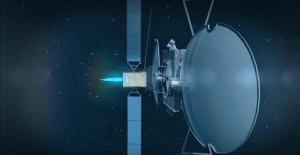Latest News
Effective Space Solutions Secures Downpayment Funding for First Two In-Orbit Servicing Spacecraft

Micro-satellite pushing a communications satellite into graveyard orbit, rendering. Photo: Effective Space Solutions
[Via Satellite 07-23-2015] When Effective Space Solutions founder and current CEO, Arie Halsband, the former general manager of Israel Aerospace Industries’ (IAI) space division, sat down in 2013 to conceptualize an in-orbit satellite servicing company, he knew that previous attempts to commercialize the service had been unsuccessful. Since that time, the company has been able to generate enough seed and round A financing for downpayments to contract launch and manufacturing for the first two spacecraft, which are estimated to cost $100 million. The company is on the verge of launching series B financing for full-scale development. The Israeli start-up, founded by satellite industry veterans, is looking to launch a fleet of spacecraft equipped to tug wayward satellites into correct orbit, de-orbit Communications Satellites (Comsats) or perform a number of other commercial in-orbit servicing operations.
“Effective Space Solutions was established to answer what we saw as a need of the communication satellite operators, which is generating additional revenues from near end-of-life satellites as well as managing their fleet in a more flexible manner,” said Meidad Pariente, chief technical officer of Effective Space Solutions.
To do this, the microsatellites will operate out of a docking station of the company’s own design to provide life-extension services that have the potential to expand mission life of a commercial satellite by up to five years, although one to two years is more realistic, according to Pariente. The company will focus on keeping Comsats in orbit for longer to generate additional revenue for commercial customers, although the fleet can offer a slew of other services including satellite relocation and use of inclined orbit satellites.
“Utilization of inclined orbit satellites will allow new satellite operators to get into the market as well as allow existing operators to explore new markets by using satellites at low cost. Instead of building new satellites, a company can purchase inclined orbit satellites and then reutilize it for a specific slot,” explained Pariente.
With Comsat operators as the main customers in mind, Effective Space Solutions microsatellites will focus on spacecraft in Geostationary Earth Orbit (GEO). While customers in GEO have the potential to generate the most revenue for the startup, Pariente notes that there are no technical limitations restricting the fleet to this area of orbit.
“Our technology can be used for MEO and LEO missions also,” said Pariente. And missions can also extend beyond Comsats, such as in-orbit debris removal. “Our robotic arms are planned to safely and firmly connect to communication satellites. In general, the simple and non-invasive nature of our design allows future expansion to debris removal and even repair missions. We will focus on commercial missions, but will support initiatives to explore debris removal.”
Taking into account previous failures to commercialize the in-orbit servicing industry, Halsband’s business plan differs from previous attempts in two major ways.
“The first difference is from a technological perspective. Our docking mechanism is non-intrusive and is generic enough to allow us to dock to any existing communication satellite,” explained Pariente. “The second difference is, from a commercial point of view, the fact that our cost structure is low, based on a fleet of small satellites, and we use ride-share for [Geostationary Transfer Orbit] GTO missions ([Evolved Expendable Launch Vehicle (EELV) Secondary Payload Adapter] ESPA class), allow us to offer a very attractive commercial proposal for satellite operators.”
By joining the technological and business advantages, Pariente believes the company can offer a more attractive vision than previous attempts. Also, the company has made sure to involve additional stakeholders, such as space law experts and insurers, from day one to ensure the mission is viable from a legal perspective.
“We have seen tremendous interest from satellite operators because our services allow them a much greater flexibility in fleet design and management,” said Pariente. “The fact that using our services, satellite operators can relax the tension of purchasing a new satellite every three years, this will allow them to have a better revenue stream at a lower risk. They are very much interested.”
Investors are interested as well.
“Several investors already shown interest in what they consider a well proven market need, strong business model and lean operation by a NewSpace private company,” said Pariente.
The company has not yet announced a manufacturer or official launch date, which Pariente assures are the horizon, but anticipates launch in the first quarter of 2017 or 2018, with its commercial service estimated in the third quarter of 2018.
Get the latest Via Satellite news!
Subscribe Now